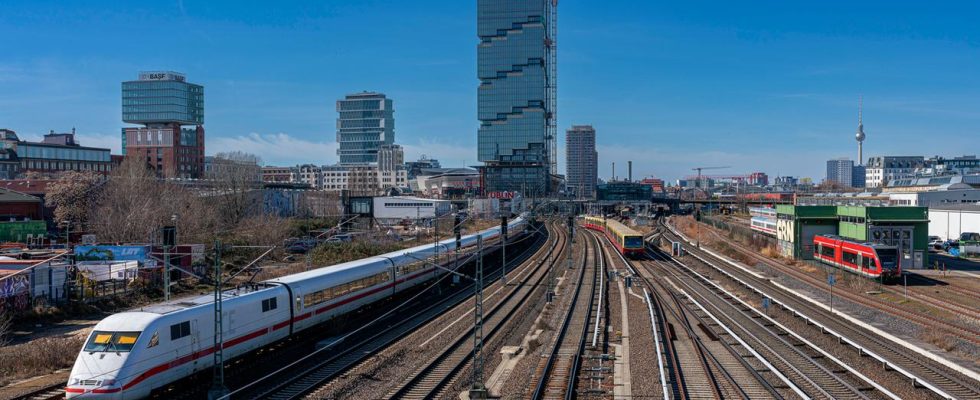background
Chancellor Scholz has declared the “Germany pace”. However, the coalition has recently stalled on key projects in the transport sector. Now there is a breakthrough. What is planned? An overview.
It is not without irony that laws for more speed are slowly finding their way into the Bundestag. Back in March, the traffic light coalition met for thirty hours, discussed, negotiated and reached a compromise on necessary traffic reforms.
But it was precisely this compromise that cracked and was renegotiated for weeks. On the one hand, this involves faster planning and approval of certain rail and highway projects and the renovation of dilapidated bridges, and on the other hand, an expansion of the truck toll.
Now the traffic light factions have achieved a “breakthrough”, as SPD parliamentary group vice-president Detlef Müller called it. “This country is suffocating in slowness when it comes to major projects,” said FDP parliamentary group leader Johannes Vogel. “We finally have to let off the brakes and we will succeed now.” The Greens also seem to have made peace with the legislative package. “I think the different aspects have now been very successful,” said the co-chair of the Green parliamentary group Britta Haßelmann. “So that we can say as a traffic light that we are now doing something for mobility and for the urgently needed renovations.”
The much-quoted “Germany pace” in the transport sector should now actually be brought to life. An overview.
Planning acceleration
A renovation backlog in the transport sector is to be lifted. This is about accelerating the implementation of rail projects, but also motorway projects that are hot spots and bottlenecks. Specifically, it’s about track extensions.
A total of 138 motorway projects are to be implemented more quickly. This emerges from an amendment from the SPD, Greens and FDP to a federal government draft law, which is available to the dpa news agency. Half of the projects are located in North Rhine-Westphalia.
The Greens had long had reservations about accelerating planning for motorways. The list of motorway expansions to be accelerated is “exhaustive” and applies once, according to a Green Party paper ARD capital studio is present. FDP circles say that motorway projects are now being decided exactly as agreed in March.
Dilapidated bridges should receive a “repair booster”. The renovation of bridges will be made faster through a number of simplifications and exceptions.
In addition, every available area on highways should be used for solar generation in the future, according to the paper. How quickly the projects would be implemented depends on the investment funds available.
Truck toll
As already provided for in the draft law, a CO2 surcharge is to be introduced for the truck toll. The traffic light coalition wants to provide incentives to accelerate the switch to trucks with climate-friendly drives. Billions in revenue from the truck toll are to flow into rail for the first time.
Rail renovation
The rail network in Germany is partly dilapidated, resulting in train cancellations and delays. From next summer until 2030, particularly heavily used routes are to be fundamentally renovated.
Federal Transport Minister Volker Wissing said in mid-September that the federal government wanted to make around 40 billion euros available to rail by 2027. The Green paper now talks about 45 billion euros. A large part of the funds will come from the reform of the truck toll.
According to the Green Party’s paper, 312 rail projects with a total length of 4,500 kilometers are to be implemented more quickly.
Strasstraffic law
“Instead of roads and cars, people and their health as well as climate protection will become the focus of transport policy in the future,” said Green Party deputy Julia Verlinden.
The background is that in addition to the fluidity and safety of traffic, the goals of climate and environmental protection, health and urban development should also be taken into account in the Road Traffic Act. According to the Green paper, the paths should become safer for cyclists and pedestrians in particular.
The reform should give municipalities the opportunity to tailor transport planning and regulations to people’s needs. For example, municipalities should be able to set up 30 km/h zones more easily.
What’s next?
Draft laws are now expected to be passed by the Bundestag this week. The Federal Council then still has to approve the changes. Some state transport ministers had already signaled that they still saw a need for improvement. Specific regulations are then contained in the road traffic regulations, which are also to be changed.
Criticism came from environmental associations. “It is not a good development that some motorways are now to be widened to up to ten lanes,” said Jens Hilgenberg, head of transport policy at BUND. The BUND rejects the current plans because they want to achieve acceleration primarily by restricting participation and legal protection procedures in planning approval.
Greenpeace mobility expert Lena Donat spoke of a lack of interest in protecting nature and the climate. “Every additional kilometer of highway destroys nature, causes even more traffic jams and wastes millions of taxpayers’ money on wrong traffic projects,” said Donat.
With information from Torben Ostermann, ARD capital studio.

